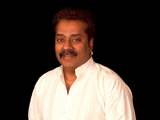Friday, June 26, 1998
SECTION: Entertainment
'Melody still has a place in film music'
Date: 26-06-1998 From ghazals to pop music, Hariharan has come a long way. V.Gangadhar speaks to the singer, who won the National Award this year. Everyone is humming his popular numbers 'Ye Lamhe Ye Pal' (''Lamhe''), 'Hai Rama' (''Rangeela''), 'Chappa Chappa' (''Maachis''), 'I Love My India' (''Pardes''), 'Chandare Chandare....' (''Sapaney''), 'Jaise Dil Hai Dhadkan Hai' (''Dil To Pagal Hai''). The songs also dominate the 'countdown' shows on television channels. His ghazal albums are chart-busters. And his emotional song from ''Border'', 'Mere Dushman... Mere Bhai.... Mere Hum Sayye' fetched him the coveted National Award for 1997. Yes, singer Hariharan is flying high these days. Composing music for his 'ghazals', experimenting with a fusion of Western and Indian music, recordings and live shows all over the world. In the midst of such a hectic schedule, he found time to grant an exclusive, 90-minutes interview to 'TheHindu' at his spacious Matunga flat. Excerpts: Music, I guess, runs in the family. Yes, it does, My grandfather came to Bombay during the 1930's to make a living from music. He was a famous harmonist. My father was in the first batch of graduates in music from the Travancore Music College. Later he was the Principal of the Music faculty, Shanmukhananda Sabha in Bombay. My mother Alamelu Mani, is again, a wellknown singer having performed all over the country, including music sabhas in Chennai. She won the President's Gold medal for her AIR music programmes. We lived in a world of music, provided by such giants as M. D. Ramanathan, Brinda amma, T. R. Mahalingam and Rajaratram Pillai, the 'nadaswaram' vidwan. I presume you also began with Carnatic music. To a certain extent, yes. My roots were in Carnatic music, but I never reached the 'cutcheri' levels. I was interested in North Indian classical music and studied under Ustad Ghulam Mustafa Khan. I liked collage and the techniques involved in North Indian vocal music. When did you enter the world of ghazals? I guess from 1977 onwards. I admired the Pakistani ghazal singer, Mehdi Hasan who came to India during those days. That was the turning point in my life. Yes, there are certain similarities. The soft tunes, romantic lyrics and low-key orchestration. That is the gist of singing ghazals. It is the conversation with one's beloved. The singing has to be in a 'conversational form' to establish rapport with the audiences. Of course, ghazals had been in vogue from the days of Amir Khusro, but the form had changed a lot with the passage of time (humming a Talat Mahmood number set to music by Madan Mohan). That was lovely ghazal. Talat saab was a great exponent of the form. I note you compose the music yourself for all your ghazals. Yes, I had been doing it from the beginning. It is a totally creative process. I composed the music for some of my best songs in just ten minutes. The nucleus gets formed and then it is not difficult to elaborate from there. Orchestration had to be minimal, only an interlude, The ghazals cannot put up with cacophony. Your diction is impeccable, that too for someone from the South. I studied Urdu for more than three years to improve my diction. The romantic lyrics had to be pronounced properly and diction is very important. Urdu is a complex language and one had to work hard to master the nuances. Your 'Colonial Cousins' album was a smash hit. How did it come about? I had done a pop album with Kavita Krishnamurthy which clicked. I used to sing jingles for Leslie Louis, my co-artiste in 'Colonial Cousins'. He hummed some pop tunes, I went along and everything fell into a pattern. We formed a two-member band and 'Colonial Cousins' emerged. Music has so many diversities and we should not hesitate to experiment. Fans from six to 60 applauded the album which won several awards. We are now working on Colonial Cousins II and the album should be out within the next few months. What kind of music shows you hold abroad? Oh, I sing all kinds of songs. Tamil film songs, Hindi film songs, ghazals and Colonial Cousin numbers. This type of variety is appreciated by the audiences. You had come a long way in Hindi and Tamil film playback singing, since the time of your debut n ''Gaman'' in 1978. I have sung more than 150 songs in Tamil films. Recently, I won the Tamil Nadu State award for my singing in the film ''Asai''. It is wonderful to work with music directors like Ilayaraja, A. R. Rehman, Deva and Vidyasagar. Tamil film music had not yet gone completely commercial. There is still some scope for melody. You seem to reserve your best for A. R. Rehman. He listens to my ghazals and appreciates my style. So we get along well. I admire his innovativeness. Rehman also offers a bit of variety in his tunes. This is satisfying to a singer. Are you choosy about your music directors? Initially, I could not afford to be choosy. Of course, I do prefer to work for certain music directors than others. I also study their tunes, the lyrics and then decide if we could work together. Will you sing songs with inane lyrics? Why not? It all depends on the situation. If the film is a slap- stick comedy and such songs are needed for certain situations, I don't mind. Of course, the lyrics should not be crude. Fortunately, I do not get many such songs. The music directors, perhaps, think, they are not my kind. Lata Mangheshkar, recently, deplored the declining standards of Hindi film music. She felt most of the present music directors had strayed away from melody. She has a point. The producers are mainly responsible for this. You see, the focus these days is on action-oriented films which offer very little scope for lilting tunes and romantic lyrics. The music has to be loud and vigorous. Singers from the South like yourself, Balasubramaniam and Yesudas, mostly sing, soft, romantic numbers in Hindi films. Not the 'Yahoo' kind of songs rendered by Mohamad Rafi. I guess we represent a different culture. The 'yahoo' songs represent the more vigorous Punjabi culture. Are you happy with what you had achieved so far? What are your future plans?
Well, I am quite happy with what I have done so far. But then, one has to be improving and setting higher goals all the time. I am now working on Colonial Cousins II', more ghazal albums and singing in quite a few prestigious Hindi and Tamil films. Mind you, melody has a place, even in today's film music.














comment:
p_commentcount